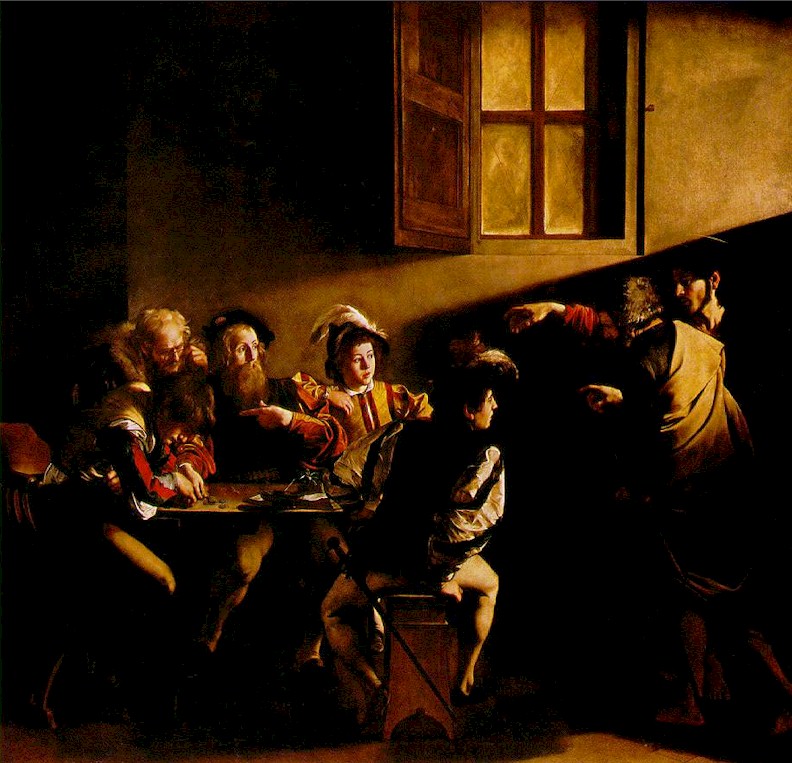Мы продолжаем напряженно работать, чтобы улучшить наш сайт и перевести его на другие языки. Русская версия этой страницы еще не совсем готова. Поэтому мы представляем здесь пока английскую версию. Мы благодарим вас за понимание.
Левий Матвей
Context
We are introduced to Matthew Levi when Yeshua is with Pontius Pilate. Yeshua distances himself from what this man writes about him. «I said decidedly nothing of what's written there», he says when Pilate confronts him with Matthew's writings.
Matthew starts playing an active role in the novel at Bald Mountain, when Ha-Nozri is executed. He is the only spectator - except for the executioners - of what happens. He's totally in despair, for he had spent the morning of the day of Yeshua's arrest with him, but in the afternoon, he had let him return to Yershalaim alone. In the evening he also could not join him because he had become ill. When Pilate read the verdict, he stood in the crowd.
He gets the idea to approach Yeshua before the execution, while he's climbing Bald Mountain, to stab him in the back with a knife and thus saving him from more suffering, but Levi has got no knife with him. So he steals one in a a little shop. But the procession has already past by, so he misses it. Together with Matthew Levi we follow the execution and we see how the thunderstorm bursts when Yeshua Ha-Nozri dies. After that, both Levi and the body of Yeshua have been gone from the hilltop.
The guards find Matthew Levi with the body of Yeshua in a cave. He is desperate and furious. They succeed to quiet the impudent madman, by promising him that the body would be buried. He's even allowed to take part in the burial and brought to Pilate. Which is very convenient, because Pilate wants to know what Levi wrote on the parchment he carries with him,. He reads it, but the last lines «...greater vice... cowardice» make him shiver. Pilate offers Levi a job as a librarian in Caesarea, but Levi refuses. He says that he wants to devote the rest of his life on trying to kill Judas of Kiriath. «Don't trouble yourself», Pilate replies, «Judas has already been killed this night. I did it». Pilate asks Matthew if he really don't want to take something and yes, he want a piece of clean parchment.
At the end of the novel, when Woland looks over Moscow from a stone terrace, Matthew Levi reappears. He says that «He» had sent him. «He» has read the master's work and sent Levi to Woland to ask him to take the master and Margarita with him and reward the master with peace. «We would never have thought of it without you», Woland says, «go». And Matthew Levi disappeared after that.
Prototype
In the canonical gospels, Jesus had 12 disciples or apostles, one of which was named Matthew Levi. That is why many Christians believe that the apostle Mattheus was the same person as the evangelist Mattheus. Historically, however, this is rather doubtful, because, if he was, he must have been very old when he wrote the gospel. Most biblical scholars date the origin of the canonical gospels as follows: Marcus circa 65; Lucas 80-85; Matthew 85-90; Johannes 90-100. Some situate them a little earlier.
In the novel, Yeshua and Matthew Levi know each other, since Yeshua talks about «one with a goatskin parchment who follows me, follows me and keeps writing all the time».
Bulgakov never mentions the apostles in the novel. Although hemakes Aphranius say that, «though we have been unable - so far at least - to discover any admirers or followers of his, it is none the less impossible to guarantee that there are none». But they play absolutely no further role, they are not even mentioned. Only Mattheus Levi is called a «disciple» once or twice, even though it is always by himself: «I, Matthew, your faithful and only disciple». Bulgakovs Mattheus Levi does have characteristics of both the apostle and the evangelist. He was a tax collector, just like the apostle Mattheus Levi, and wrote down the acts of Jesus, just like the evangelist.
The apostle Matthew's calling by Jesus was rather controversial. The evangelist Matthew wrote that, after a conflict with the teachers of the law in connection with the healing of a paralyzed man, Jesus left Jerusalem and went to the Lake Tiberias also called the Sea of Galilee. Along Capernaum, a town near the lake, was the main road from Syria to Egypt.
Goods entering Herodes' territory were taxed at the Capernaum tollbooth. The tax collectors cashed the tolls for the occupying force and often demanded more money than required to keep the rest for themselves. People hated them and they were so despised that their money was not accepted by the Jewish as alms and that their testimony was not legitimated in Jewish courts, because they were ritually unclean by their contacts with heathens.
The apostle Matthew, who is called «Levi» by the evangelists Mark and Luke, was such a tax collector, and the fact that Jesus calls exactly this tax collector in his entourage must have been very questionable to many Jews. When Jesus calls him, Matthew leaves his work and his old life behind and follows Jesus as his disciple. They enter the house of Matthew and have a feast, on which Jesus and the disciples were sitting together with many tax collectors and sinners.
In the novel, Pilate is really stunned: «Oh, city of Yershalaim! What does one not hear in it! A tax collector, do you hear, threw money down in the road!» Yet, this is a scene where Mikhail Bulgakov quite faithfully followed the canonical gospels.
The evangelist Matthew describes the calling of the apostle Matthew as follows: 9:9 - «As Jesus passed on from there, he saw a man named Matthew sitting at the customs post. He said to him, 'Follow me.' And he got up and followed him».

Призвание апостола Матфея (Караваджо)




